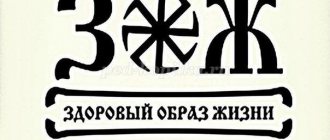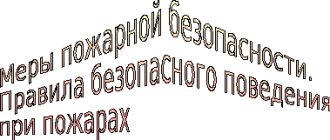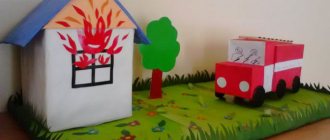Lesson summary on life safety: “Fire safety”
During the classes
- Class organization.
Greetings. Checking the class roster.
- State the topic and purpose of the lesson.
- Working on new material.
Fire –
This is an uncontrolled burning that causes material damage, harm to the life and health of citizens, and the interests of society and the state.
Fire safety -
This is a state of protection of the individual, property, society and state from fires.
Fires have occurred and occur periodically - at economic facilities, in transport, in residential buildings and public buildings.
Fires occur especially often in the residential sector and public places (in crowded places). This is where they pose the greatest danger.
The confinement of burning rooms and the associated excessive crowding of people, possible panic, vertical spread of fire, toxic substances released when synthetic materials burn - all this leads to the most tragic consequences.
Attention!
Fires occur where a person uses fire for his daily needs and where, due to violations of fire safety rules, the fire gets out of his control.
Most often, fires occur due to the so-called human factor. This happens when people, due to their illiteracy in the field of fire safety, negligence and indiscipline, violate fire safety rules in everyday life.
The human factor turns fire into a terrible, all-destroying element.
Fire becomes the enemy of man:
- if its use in the process of life is treated irresponsibly;
- if established fire safety standards are not observed;
- if they try to use the power of fire not for creation, but for destruction (arson, armed conflicts);
- if control over the combustion process is lost.
As soon as the fire escapes from human control, a fire breaks out with all the ensuing consequences.
The most common causes of fires in the home
Careless handling of fire:
- throwing unextinguished cigarette butts and matches, smoking in undesignated areas;
- lighting fires in the courtyards of residential buildings or garden plots;
- warming frozen heating pipes in winter with a blowtorch or torch;
- heating flammable household chemicals on the stove;
- cleaning oily clothing with flammable liquids in enclosed spaces;
- careless storage of flammable liquids;
- application for lighting open fires;
- carrying out gas and electric welding without following safety rules.
Malfunction and improper operation of electrical equipment:
- overloading the electrical network by plugging several electrical appliances into one outlet;
- damage to electrical appliances, careless connection, exposed or poor insulation of wires;
- leaving electric heating devices plugged in for a long time and causing them to overheat;
- location of additional electric heaters close to flammable objects (curtains, drapes, bedspreads, etc.);
- violation of the rules for operating electrical appliances specified in the manufacturer's instructions;
- operation of electric furnaces not equipped with thermostats.
Incorrect operation of stove heating:
- malfunction of stoves and their poor preparation for the heating season;
- chimneys and stoves not cleared of soot in a timely manner;
- installation of metal stoves that do not meet fire safety requirements;
- leaving a burning stove unattended;
- use of gasoline, kerosene, diesel fuel and other flammable liquids for igniting the stove.
Children's pranks:
- game with matches;
- making fires in basements and attics;
- arson of poplar fluff in the summer;
- violation of the rules for handling pyrotechnics.
In the process of life, man gradually developed fire safety measures in order to reduce the damage from the destructive power of fire when it got out of control. Fire safety measures are actions to ensure it and fulfill its requirements.
In human activities to ensure fire safety, three interrelated areas .
First direction
is the development and improvement of fire safety requirements, which are established by federal laws or other regulatory legal acts and determine a number of social and technical conditions for ensuring fire safety. These conditions determined and determine the norms of human behavior in the process of his life to prevent fires.
Second direction
- this is the determination of the order and organization of fire extinguishing. Firefighting is combat operations aimed at saving people, property and extinguishing fires. The organization and effectiveness of such actions have always depended on the forces and means involved in fighting fires.
Third direction
– this is the creation and improvement of a system for training the population in the field of fire safety, teaching the rules of safe behavior in case of fire to reduce the risk factor to life and health.
Everyone should know this
Currently, in the Russian Federation, fire protection is a large and complex structure. Its main part is the Federal Fire Service of the State Fire Service,
which is part of the system of the Ministry of Emergency Situations of Russia1. This is a powerful and mobile structure, the main tasks of which are: organization and implementation of state fire supervision in the Russian Federation; organization and implementation of protection of settlements and enterprises from fires; extinguishing fires.
Fire protection is divided into the following types
:
- State Fire Service;
- municipal fire department;
- departmental fire protection;
- private fire protection;
- volunteer fire department.
The State Fire Service includes
Federal Fire Service, fire services of the constituent entities of the Russian Federation.
Legislation of the Russian Federation on fire safety
The need to comply with fire safety rules is dictated by the laws of life and determined by the legislation of the Russian Federation. For citizens of the Russian Federation by the Federal Law “On Fire Safety” (dated December 21, 1994 No. 69-FZ)
There are certain rights, duties and responsibilities in the field of fire safety.
Citizens have the right to:
- protection of their life, health and property in case of fire;
- compensation for damage caused by fire in the manner prescribed by current legislation;
- participation in establishing the causes of the fire that caused damage to their health and property;
- obtaining information on fire safety issues, including in the prescribed manner, from management bodies and fire departments;
- participation in ensuring fire safety, including, in accordance with the established procedure, in the activities of the voluntary fire department.
Citizens are obliged:
- comply with fire safety requirements;
- have in the premises and buildings in their ownership (use) primary fire extinguishing means and fire-fighting equipment in accordance with fire safety rules and lists approved by the relevant local government bodies;
- If fires are detected, immediately notify the fire brigade;
- before the arrival of the fire department, take all feasible measures to save people, property and extinguish fires;
- assist the fire department in extinguishing fires;
- comply with orders, regulations and other legal requirements of state fire inspection officials;
- provide the opportunity for officials of the state fire supervision to conduct inspections and inspections of production, utility, residential and other premises and buildings belonging to them in order to monitor compliance with fire safety requirements and suppress their violations.
Citizens for violating fire safety requirements,
and also for other offenses in the field of fire safety may be subject to disciplinary, administrative or criminal liability in accordance with current legislation.
Article 167 “Deliberate destruction or damage to property” of the Criminal Code of the Russian Federation provides for:
“Intentional destruction or damage to someone else’s property, if these acts entailed causing significant damage, is punishable by a fine in the amount of up to forty thousand rubles or in the amount of the wages or other income of the convicted person for a period of up to three months, or by compulsory labor for a period of one hundred to one hundred and eighty hours. , or correctional labor for a term of up to one year, or arrest for a term of up to three months, or imprisonment for a term of up to two years. The same acts, committed out of hooligan motives, by arson, explosion or other generally dangerous method, or which through negligence resulted in the death of a person or other grave consequences, are punishable by imprisonment for a term of up to five years.”
- Conclusions.
- Most often, fires occur in residential areas and public places.
- A person’s personal safety in situations arising from a fire primarily depends on his behavior and ability to act adequately during a fire.
- The Federal Fire Service of the State Fire Service is the main link in the fire protection system of the Russian Federation.
- Primary control of knowledge and consolidation of material.
Questions.
- What rights do citizens of the Russian Federation have in the field of fire safety?
- What responsibilities are assigned to citizens of the Russian Federation in the field of fire safety?
- What are the most common causes of fires in everyday life?
- Why can connecting several electrical appliances to one outlet cause a fire? Justify your answer.
- End of lesson. Reflection.
Self-assessment of students, evaluation of work by the teacher, issuing and commenting on grades.
- Homework.
- Prepare for retelling §1 “Fire safety. Rights and responsibilities of citizens in the field of fire safety";
- Complete the task (section “Task”, page 10).
- Study and read Additional materials to § 1.
- Exercise.
- Using the Internet and the media, find examples of disastrous fires that occurred due to violations of fire safety rules.
- Additional materials to §1.
Recently, in our country there has been a tendency towards a reduction in the number of fires and cases involving death and injury due to them. The Russian Ministry of Emergency Situations is implementing a set of measures to improve the system of rapid response to fires. For this purpose, fire and rescue units are being created in the Russian Ministry of Emergency Situations.
Rescuers of the Ministry of Emergency Situations undergo special training. First aid vehicles and pulse fire extinguishing units are being added to combat crews. Based on the T-64 tank, the Impulse vehicle was created, which extinguishes fire ten times more efficiently than conventional ones. In addition, with the help of a 120-mm mortar, a 25-kilogram capsule filled with fire extinguishing powder can be placed into a fire located at a distance of 1000 m. This machine is designed to extinguish large fires at oil storage facilities, oil production sites, and at various industrial and civil facilities by installing multiple launch rocket fire capsules with fire extinguishing powder.
The All-Russian Research Institute of Fire Defense of the Russian Ministry of Emergency Situations also deals with fire safety issues.
In the Russian Federation, since June 2003, new Fire Safety Rules (PPB-01-03), approved by order of the Ministry of Emergency Situations of Russia dated June 18, 2003 No. 313, have been in force.
1 EMERCOM of Russia – Ministry of the Russian Federation for Civil Defense, Emergency Situations and Disaster Relief.
extracurricular activity “Fire safety”
author: Malysheva Irina Vladimirovna
Teacher of the Kalachinsky Adaptive Boarding School
extracurricular activity “Fire safety”
Topic: “Fire safety”.
Target:
introduce fire safety rules and the sequence of actions in case of fire.
Tasks:
- Familiarize yourself with the main causes of fires and primary fire extinguishing means;
- Learn to follow fire safety rules and the ability to behave correctly in an extreme situation, to quickly respond to danger;
- Develop cognitive interests;
- Foster a sense of pride in the people of the firefighting profession;
During the classes
- Organizing time
Whether during the day, at night, or early in the morning, if something catches fire, the fire department quickly rushes to help. Remember, friends, that you CANNOT joke with fire!
Fire has long been man's friend. The fire has great power. But if this power is handled unwisely and carelessly, then fire can become a terrible, insidious enemy. It claims millions of human lives, wipes out both large cities and small villages from the face of the Earth. Every five seconds there is a new fire. Enterprises and hospitals, trains and planes, forests, fields and houses are burning. The result is colossal losses. And most importantly, tens of thousands of human victims, including children.
- Communicating the Topic and Goals
- Guys, what are we going to talk about today?
- Right. Today we will talk about proper handling of fire, get acquainted with fire safety rules, learn how to behave in case of fire and finally play a game.
Without fire, life on Earth is impossible. It is needed everywhere: in homes and schools, in factories and factories, on farms and in agricultural production. Fire melts ore, helping a person obtain metal. The operation of internal combustion engines, the flights of jetliners and spaceships became possible thanks to the mastery and skillful use of the mighty power of fire. Fire is the enemy
if it is treated carelessly and does not follow the rules for handling fire.
But there are people whose profession is to defeat fire, saving people in trouble. They are fearless, strong, selfless. Firefighters wear special clothing that protects them from fire and smoke and constantly train, conduct special exercises,
What are people in this profession called? Firefighters.
In Russia, the first fire brigade was organized in 1803 by order of Emperor Alexander I. Now there are fire brigades in every city.
Firefighters now have powerful equipment - fire trucks, ships and boats, special fire trains, heat-reflecting suits and a variety of fire extinguishing agents. But the main work is still done by man. A firefighter must not only fight a fire using the achievements of science and technology, but also be able to competently provide first aid to victims, calm people down, and lead them out of a burning building.
At all times, firefighters come to help at the first call. They think about their own safety last. The firefighter's profession is considered one of the most dangerous in the world, so it requires dedication, fearlessness, courage and will.
What is the job of firefighters?
Firefighters inspect every building; no new house is built without their permission, no factory or plant is built, no new building material appears. Firefighters inspect warehouses, shops, hotels, cafes and restaurants and check fire safety everywhere.
Fires occur much more often in residential buildings than in public or industrial buildings.
The causes of fires are the same in all cases:
— Careless handling of fire.
— Careless use of household heating appliances.
— Violation of fire safety rules when operating the network and electrical wiring.
— Fire of televisions and radio equipment.
- Children's game with matches.
— Violation of the rules for storing and using flammable and flammable liquids;
— Domestic gas leak;
— Careless handling of pyrotechnic products (crackers, firecrackers, sparklers, fireworks, etc.)
- How can you put out a fire? Children.
Water, sand, earth, fire extinguishers, soap solution, powder.
If you smell burning, see smoke or fire, immediately call “01” for a fire brigade.
How many of you know what firefighters use to travel around the city? Right! They have specially equipped fire engines at their disposal. They are bright red with a folding ladder on the roof. As they rush through the streets, all other cars give way to them after hearing the loud sound of a fire siren.
Fire trucks drive several at a time. Each car has a brigade of firefighters.
Fires are very dangerous. In a fire, things, an apartment, and even an entire house can burn down. But the main thing is that people can die in a fire.
Remember fire safety rules.
Rule 1
. Don't play around with matches and lighters at home. This is one of the causes of fires.
Rule 2
. When leaving a room or home, do not forget to turn off electrical appliances.
Rule 3
. Do not dry clothes over the stove.
Rule 4
. Never light fireworks, candles or sparklers at home (and in general it is better to do this only with adults).
Rule 5
. In a village or in a country house without adults, do not go near the stove and do not open the stove door (a leaking ember could cause the house to catch fire).
Rule 6.
Do not decorate the Christmas tree with toys made of flammable materials.
Rule 7.
Don't play with matches.
What to do if there is a fire in the house?
Rule 1
. Call an adult for help, call a fire truck by number 01.
If the fire is small, you can try to put it out immediately by throwing a thick cloth or blanket over it or pouring a pan of water.
Rule 2
. If the fire does not go out immediately, immediately run away from the house to a safe place, or ask your neighbors to call 01.
Rule 3
. If you cannot escape from a burning apartment, immediately call 01 and tell the firefighters the exact address and number of your apartment.
Rule 4
. In a fire, smoke is much more dangerous than fire. Most people in a fire die from smoke. If you feel like you are suffocating, squat down or crawl towards the exit - there is less smoke below.
Rule 5
. During a fire, never get into an elevator. He may shut down and you will suffocate.
Rule 6
. While waiting for the firefighters to arrive, do not lose your head and do not jump out of the window. You will definitely be saved.
Rule 7
. When the firefighters arrive, listen to them in everything and don’t be afraid. They know better how to save you.
Assignment for children in groups.
1 group
What to do
if your TV catches fire.
- Turn off the power to the TV (pull out the plug from the socket).2. Notify the fire department by phone 01.3. If the burning continues, cover the TV with a thick cloth, approaching the TV from the side, you can pour water on it.4. If you are unable to cope with the fire, leave the room, tightly closing the doors and windows. Tell your neighbors.
2nd group
– your actions
in a smoky room, if there is a possibility of exit
.
- Call the rescue service “01.”2. Breathe through wet cloth.3. Move by crouching or crawling towards the exit.4. Do not enter areas where there is a high concentration of smoke.5. Closing the door tightly behind you, move along the wall towards the stairs.
3 group
- your actions in the event
that the fire has cut off the path to the exit.
- Call the rescue service “01”2. Plug all the cracks in the door with rags and pour water on the door.3. Create a supply of water in the bathroom.4. It is better to be on the floor near the window, breathing through a wet cloth, or go out onto the balcony.5. Take with you a wet blanket to protect yourself from fire (if it starts to penetrate), a flashlight and a bright rag to signal rescuers.
1. If your clothes are on fire, do not try to run under any circumstances, the fire will flare up even stronger.
2. You need to throw off your burning clothes as quickly as possible, try to put out the flames - fall to the ground and roll around; if there is a puddle or snowdrift nearby - fall into them.
3. If you are indoors, you can throw some thick fabric (blanket, bedspread, coat) over yourself, just leave your head uncovered so as not to choke on smoke.
4. Before the doctors arrive, do not remove clothes from burned areas of the body yourself!
First aid for burns:
1.Apply a damp and cold cloth to the burn site, it’s good if you have
2.sterile bandage, napkins (drivers usually have them in first aid kits), you can moisten the affected area with cold water.
3. Do not tear off clothing from the affected areas, do not lubricate the burn with oils and ointments, wait for the ambulance to arrive.
Physical exercise.
Game "Fire - Water"
The presenter is selected at will, either by counting or in another way. When the presenter says loudly: “Fire,” everyone begins to squat; when he says: “Water,” everyone begins to jump. The presenter tries to confuse the players, sometimes repeating the same word in a row, changing the intonation, making movements corresponding to a different word
- Consolidation
Game “This is me, this is me, these are all my friends!”
Teacher:
And now we will play a game of attention. I will ask, if you agree, answer “IT'S ME, IT'S ME, THESE ARE ALL MY FRIENDS!”, and if not, then clap your hands.
- Who, upon hearing the smell of burning, will report a fire?
- Who among you, noticing the smoke, will shout “Fire! We're on fire!"?
- Which of you plays tricks with fire, morning, evening and afternoon?
- Who, sensing gas in the apartment, will call “04”?
- Who can quietly hide matches from their little sister?
- Which one of you is playing with fire? Be honest about it!
- Who does not light fires and does not allow others to
Game: “WHAT? WHERE? WHEN?"
- Why are firefighters called by phone “01”?
— “01” is the simplest and shortest number, it’s easy to remember. This number is easy to dial even in the dark and by touch.
- Why is the fire truck red?
- Red, so that from afar it can be seen that a fire truck is driving, to which it is necessary to give way. Red is the color of fire.
- How do firefighters dress?
— Firefighters wear a canvas suit. It doesn't burn, doesn't get wet. A helmet protects the head from blows, mittens on the hands, and boots on the feet. To work in fire and smoke, firefighters need breathing apparatus.
- Why are fires dangerous?
— In a fire, things, an apartment, and even a whole house can burn down. But the worst thing is that people can die in a fire.
- How can you extinguish a starting fire?
— A fire can be extinguished with a fire extinguisher, water, sand, or a blanket.
- Why do fires happen?
— Fires occur if fire safety rules are not followed: a TV, iron, gas stove, etc. are left unattended; if you play with matches.
7.What should you say when calling the fire department?
— Do you need to provide your exact address, last name, first name, and what’s on fire?
- Where is it better to hide in case of fire: in the closet or under the sofa?
“You can’t hide: the firefighters won’t find you, you could suffocate.”
- What should you do if there is a lot of smoke in the apartment?
- You need to wet your clothes with water, cover your head with a wet cloth, breathe through the wetted cloth, and crawl towards the exit.
- What will you do if you see that the lower floors of the house are engulfed in flames?
— Wet your clothes and everything around you, wait for help.
- Why can't you use the elevator during a fire?
— During a fire, an elevator is a real chimney in which it is easy to suffocate. In addition, in the event of a fire, it may turn off.
- You were given wonderful fireworks and sparklers for the New Year. Where will you light them?
— Fireworks, candles, sparklers can only be lit with adults outside the home.
To avoid dangerous situations, remember the fire safety rules (memos are distributed to students).
- Lesson summary:
You need to be extremely careful with fire. When used in a controlled situation, it helps a lot in life and many processes are impossible without it. But in the hands of irresponsible people, fire becomes very dangerous. Name the topic of our conversation. What we were talking about? - Reflection
Guys, what do you remember? Raise your hand, how many of you think they did a good job today? Who is not very happy with their job? Raise your hand, who will do better in the next lesson than today?
extracurricular activity “Fire safety”





